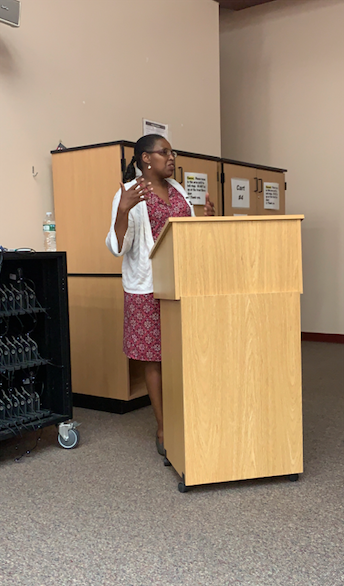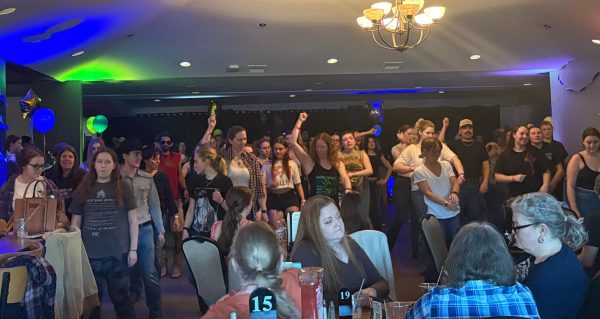Rwandan Genocide Survivor Shares Her Story

Eugenie Mukeshimana is returning to Rwanda in June with her daughter for the first time in 17 years. (Photo by Brianna Riedmueller)
In late April, Eugenie Mukeshimana, a Rwandan genocide survivor, came to Warren Hills to share her moving story.
The genocide was sparked by the death of Rwandan President Juvenal Habyarimana, a Hutu, when his plane was shot down above Kigali Airport on April 6, 1994. The Hutu turned on the Tutsi and started killing them. The Tutsis were often in a position of economic dominance to the soil-tilling Hutus. In many areas, the minority Tutsis ruled the Hutus.
Mukeshimana said she was raised in Rwanda without knowledge of whether she was considered a Hutu or a Tutsi, seeing as the two groups were very susceptible to interpretation. Her father did not want her to feel as though she was different from other children.
While nine months pregnant, Mukeshimana woke up on April 7, 1994, and noticed no cars or people in the streets.
“It was unusual because we lived in a city so people usually were out on the street,” she said.
They were greeted at their door by neighbors. They told Mukeshimana that they were sent there to kill her and her husband.
“The first group didn’t come from far. They were our neighbors. We knew them,” she said.
Mukeshimana said she bribed the men into leaving them alone. Two more groups of men came along and Mukeshimana bribed them, too.
Mukeshimana left the house with her husband and went to their neighbors, whom they had grown close with over the past few years, but when the neighbor’s husband got home, he told them they had to leave or he would have to kill them.
“It was the way he said it. He could have said it in a way to show he still cared, but he didn’t. He was cold,” she said.
They were shocked, because the two families had grown close over many years, but they left and realized they had nowhere to go.
Mukeshimana and her husband were separated due to limited space in safe houses. Mukeshimana had to sleep under a bed, hidden from the children sleeping on it.
“The only space I could try to go to get more space was towards the wall, so when the bed caves in, the children didn’t feel me,” she said.
After a while, she was discovered by Hutus and lied about her identity.
“They didn’t know who I was and the family I was staying with convinced them I was a family member, so they sent me back to the town I had said I came from,” she said.
Her baby was born and she had to decide whether to keep the baby and risk getting caught, or leave it and risk the baby dying or never seeing the baby again.
“I realized very quickly that the situation was changing,” she said. “It would be impossible to keep the baby quiet because I had no clothes for her and it was no guarantee that I would have milk for her.”
She said she decided to keep the baby and they hid in a new safe house, where she had to hide from three Hutus that lived in the house. Finally, the woman hiding her kicked Mukeshimana out into the streets.
“One of the two women who were helping me hide decided I wasn’t worth the risk,” she said.
A man saw her on the street and decided to take her as a “slave,” instead of shooting her on the spot. She would cook and clean for him, until he decided when he wanted to shoot and kill her.
One day, the man went out of town and the chaos blocked off the streets and he couldn’t get back into the house to Mukeshimana and her baby.
“That’s the only reason I survived with the baby,” Mukeshimana said.
After the genocide finally ended, Mukeshimana found out that her husband did not survive the genocide. She then moved to the United States to attend college, while raising her daughter.




